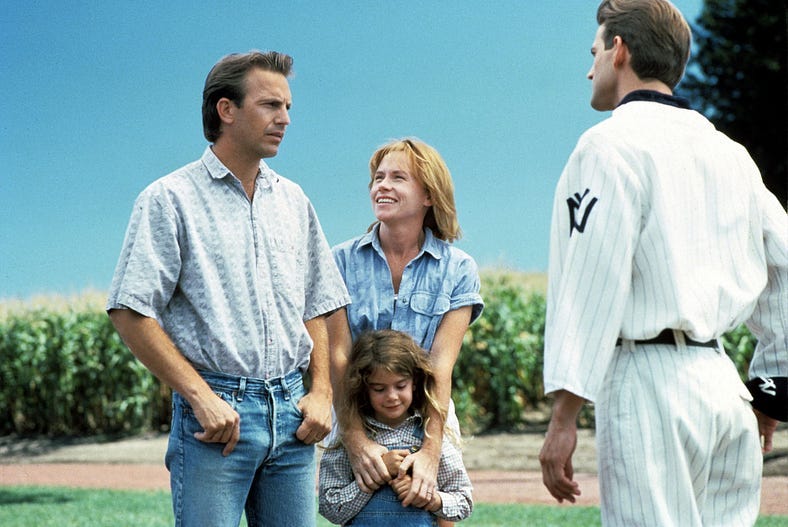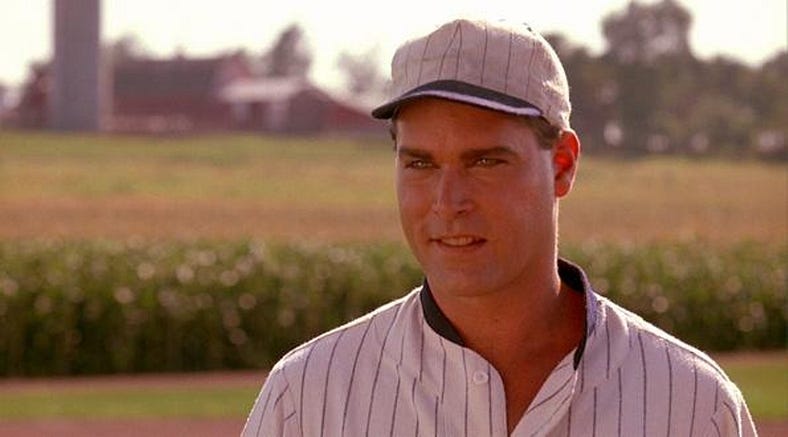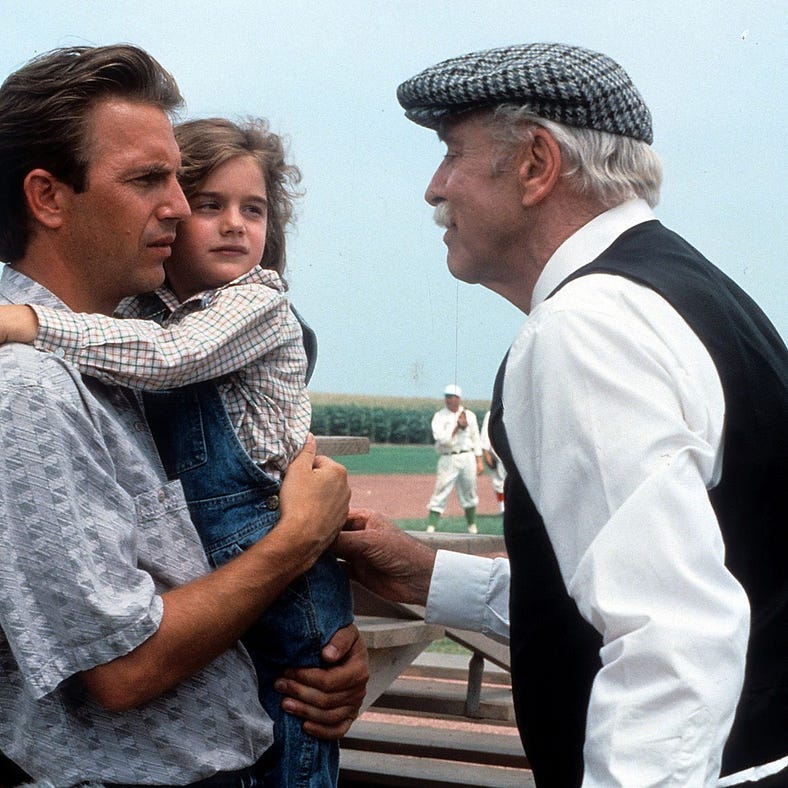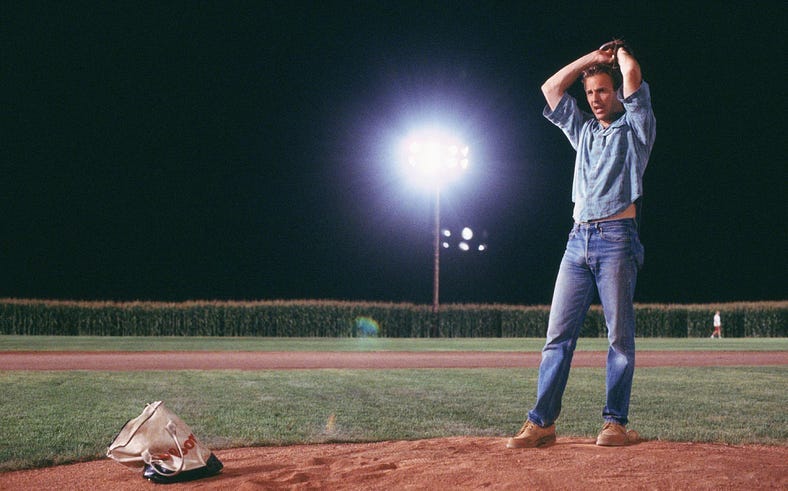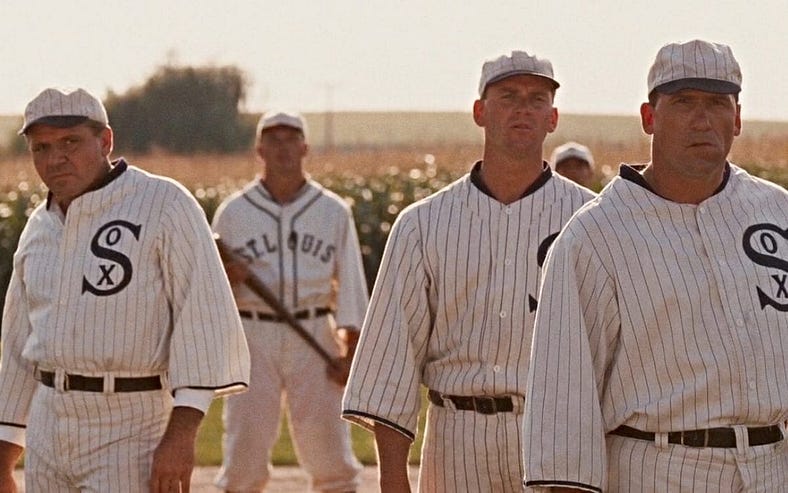Why this Scene from FIELD OF DREAMS Makes Us Cry Every Time
It's not just the beautiful music...
Why does the closing sequence of Field of Dreams, in which Ray (played by Kevin Costner) plays catch with his father, consistently move audiences to tears?
The emotional impact of this moment is crafted not only through the themes it explores but also through the masterful build-up throughout the film and the way it utilizes filmmaking techniques and music to break viewers down emotionally. “Dad!” Let’s dive deeper.
An Emotional Rollercoaster
First, let’s address the fact that the entire film is an emotional rollercoaster. It takes audiences on a journey of faith and hope, peppered with moments of uncertainty and emotional vulnerability.
First, several twists and turns feed into the film’s themes of regret and redemption. For instance, at one point in the film, Ray hears a voice urging him to “Ease his pain.” As the story unfolds, we realize this pain is not just Shoeless Joe Jackson’s but Ray’s unresolved issues with his father.
Also, scenes like Ray’s daughter falling and nearly dying from choking or Terence Mann symbolically going to heaven through a corn field continue to wear us down emotionally. In fact, each new figure we meet, from Joe to Moonlight Graham, carry their own sense of longing and unfinished business. Their interactions with Ray slowly chip away at his emotional armor, planting seeds of nostalgia and loss.
These moments set up the audience for a final emotional payoff. By the time Ray realizes that his father has been with him all along, audiences are primed to feel the weight of the moment.
The Scene
Besides the setup for the catching scene itself, there are several reasons why it hits so hard.
First, playing catch with a parent is a simple yet profoundly symbolic gesture, representing connection, forgiveness, and lost time. Many viewers relate to strained parental relationships, making this moment personal and cathartic.
Also, after enduring the emotional ups and downs of the film mentioned earlier, Ray is finally at peace. His willingness to ask his father to “have a catch” symbolizes his growth and healing, finally giving him some sense of closure with his father.
The scene is also slower and quiet, giving both characters space to reconnect. The stillness allows the emotion to settle in, encouraging the audience to reflect on their own experiences.
Now, let’s take a look at the filmmaking techniques that amplify emotion.
Lighting and Atmosphere
The golden-hour glow creates a dreamlike, almost spiritual quality, emphasizing the moment's magic.
The Music
Let’s talk about that magical score by the late James Horner. Maybe his best work ever. His score is crucial to why the final scene hits with such emotional force. Known for his ability to evoke deep feelings through subtle, melodic compositions, Horner’s work in Field of Dreams is no exception. The music doesn’t simply accompany the visuals — it elevates them, guiding the audience through the emotional terrain of the story’s climax.
In the final scene, the music starts gently, reflecting the quiet reverence of the moment. Horner uses soft strings and piano, creating a sense of anticipation and introspection. The absence of grand, sweeping notes initially mirrors the characters’ cautious, tender connection. But As Ray asks, “Do you wanna have a catch?” the score gradually swells. This shift is significant — it mirrors the emotional release the audience feels. The music becomes more expansive, layering in orchestral elements that evoke a sense of triumph and closure.
A Final Release
The brilliance of this scene is in how it follows an emotional rollercoaster, leaving viewers raw and vulnerable. When Ray asks his father to play catch, most audiences have already been softened by the film’s exploration of dreams, regrets, and second chances. The catch scene feels like a final release — a culmination of every heartstring pulled throughout the movie.
Through careful storytelling, beautiful music, emotional build-up, and thoughtful filmmaking, this moment delivers a powerful, tear-inducing payoff that stays with viewers long after the credits roll.


